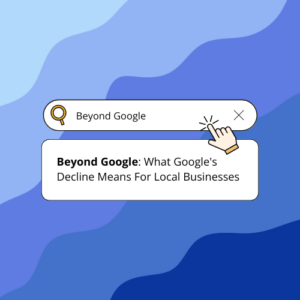Seeing declining returns from your efforts on Google? You’re not alone. Between the search engine’s constant ranking experiments, variable AI-powered results, and decreasing market share, businesses and consumers alike are turning their attention elsewhere. While Google is still inimitable in the realm of local search, it seems like the rules are changing.

In the game of search, visibility equates to viability. And as Google loses footing as the undisputed #1, local businesses will face a pivotal crossroad. For years, Google has been the colossus dominating the search engine landscape. As the default search engine on countless smartphones, laptops, and other devices, it doesn’t come as a surprise that the company maintained over 90% market share for years. Yet, recent data signals a shift: Google’s once unbreakable grip on the search engine market in the US has waned over the past year. While it wasn’t as dramatic a drop as Statcounter first reported, Google has been consistently losing U.S. search market share since August 2023, when it was at 89.03%. Google’s highest search market share in the past 12 months was 89.1% in May 2023. The change in user behavior offers both a challenge and an opportunity: the need for business owners to rethink and broaden the scope of their local search marketing strategies.
Google Set Many of the Precedents In Local Search We Now Consider Universal
To tell the story of Google’s decline, we have to start at the beginning. The company, launched in 1998, revolutionized the digital world, setting many of the standards now considered universal in search technology. With the introduction of its PageRank algorithm, it transformed search by evaluating the relevance of websites based on the number and quality of links pointing to them. This breakthrough changed search results for the better, establishing the fundamental principles of search engine operations that we rely upon today (and that imitators would go on to follow).
Over the years, Google has continued to innovate, integrating services like maps, business listings, and voice search into its platform. Google is synonymous with search, shaping the industry and laying the groundwork for the modern search mechanisms we know today. The company’s precedents act as our baseline understanding of how search works, influencing how information is organized, accessed, and utilized by people across the world.

Although Google Lay the Foundations, The Search Engine Landscape Has Evolved
In April 2023, the fabric of the search engine market began to rip. As Google’s market share dropped, with smaller players like Bing and DuckDuckGo claimed the leftover market share, indicating a wild shift in the world of search.
Google isn’t in a race to the bottom by any accounts. But still, the shift conveys the fragmented and diverging state of user preferences. Likely driven by factors such as increased concern for privacy and personalized search experiences, the trends suggest that times are changing.
As these alternative platforms gain traction, they create new frontiers for businesses to explore and conquer, forcing them to think beyond Google when it comes to digital strategy.
So, Why is Google Losing Market Share?
Because of its prolonged domination and influence in the search engine space, Google’s steady decline might come as a surprise. But for those who know the search engine intimately, the news isn’t all that shocking. Known for its bold experimentation, the company has made changes that might make consumers think twice about their search engine of choice. A number of factors are at play here, including:
- Privacy-minded consumers switching to more secure platforms like DuckDuckGo
- More consumers using voice assistants or AI chatbots to source information
- Users’ growing dissatisfaction with Google results due to the gaming of SEO tactics and myriad of AI-written content online
- The rise of country-specific search platforms (like Baidu and Yandex) that excel at providing local information
Consumer Preferences for Search Are Changing
With data privacy concerns on the rise, privacy-centric search engines like DuckDuckGo are primed for gaining traction. Worried about how their search behaviors are tracked and utilized by companies, consumers are making it clear that they don’t want their online activities monitored. This is made even more evident by the increased adoption of VPNs across the US: 46% of adults report using a VPN, up from 39% last year.
While DuckDuckGo enjoyed the boost from shifting consumer preferences, Bing capitalized on its strategic integrations with Microsoft products and services. For customers already in the Microsoft ecosystem, switching to Bing was the obvious choice. And as the search engine experiments with AI-powered search, it’s experienced a sharp rise in popularity as people try out the new features.
There’s also a growing portion of the digital landscape that relies upon specialized search tools embedded within other platforms like social media and e-commerce sites (like shopping-specific search sites). These platforms give the user a tailored search experience, making it ideal for their specific needs.
Finally, regulatory pressures and antitrust scrutiny in various regions around the world have destabilized Google’s dominance, pushing some users to explore alternatives. Combined, these elements gradually caused users to jump ship, affecting Google’s once unchallenged supremacy in the search engine market.

Key Economic and Market Forces Are Also at Play
The tech industry has always been aggressively competitive, and the search engine space is no different. Despite Google’s historical supremacy, the competitive environment has always prompted innovation and even alliances.
Global market variations also played a crucial role. Users from regions like Europe and Asia have distinct preferences and legal environments that influence search engine popularity and functionality. In China, Google isn’t the undisputed king; Baidu dominates due to its focus on local expertise and compliance with government regulations. The same is true of Yandex in Russia. These regional differences highlight the importance of understanding local consumer behaviors and regulations, challenging global players like Google to adapt and compete effectively across the world.
While regulations can drive innovation, it’s clear that Google’s strategy of being everything for everyone isn’t going to work anymore. The globally competitive dynamics are ultimately altering market shares, driving the evolution of search technologies and business strategies at a record pace.

Companies Will Need to Think Beyond Google to Win at Local Search
While Google is in turmoil, businesses with a Google-centric approach to local and digital marketing will be vulnerable to disruption. Dependending on one search engine, regardless of its prevalence, exposes businesses to the whims of search algorithms and market dynamics. For example, a local diner that appears at the top of Google searches but is invisible on Bing might miss out on a significant portion of potential customers in the Microsoft ecosystem.
Why Diversification is More Crucial Than Ever
For businesses, diversifying their online presence will no longer be just a defensive strategy. Instead, focusing broadly on a variety of listings sites and search engines is a proactive approach that maximizes opportunities. Here are the facts:
- Each search engine caters to a unique user demographic and intent
- By ensuring visibility across multiple engines, businesses can capture diverse customers that might otherwise remain unaware
- Building a multi-channel presence bolsters trust and brand reputation by ensuring visibility across the web
As the format of search engines themselves changes, businesses will need the right tools to keep up and innovate. Between competing platforms and consumers using voice assistants or chatbots like ChatGPT for their queries, companies hoping to remain competitive in the local marketplace need to diversify their online strategies as soon as possible!
Strategic Marketing Considerations Necessitate New Tactics and New Tools
In an era with multiple viable search platforms, local listings management platforms like Synup become invaluable. After all, they do more than merely list your business across various search engines; they synchronize and manage your presence, ensuring that your business information is accurate, consistent, and universally accessible – regardless of where a customer is searching from or which search engine they use.
To stay afloat, businesses that rely on local search for their bottom line will need to implement new strategies and tools to prepare for the next stage of search. Tools like Synup can ensure businesses extend their online presence far beyond Google, listing them on platforms like:
- Bing
- Apple Maps
- TripAdvisor
- Industry-specific directories
By maintaining a presence across a diverse variety of platforms, businesses ensure that customers can find them in every corner of the internet.
How Can Businesses Keep Up With Search Engine Volatility?
Not all hope is lost! To diversify their online presence, businesses can leverage platforms like Synup. When it comes to managing online presence across multiple search engines, these tools are invaluable when it comes to ensuring accuracy and consistency.

Effective Tools Streamline Strategy Implementation
These platforms automate the tasks of distributing and synchronizing business listings from Google to Bing and beyond, allowing businesses to reach potential customers wherever they choose to search. Plus, platform analytics help businesses understand search trends and adapt their marketing strategies accordingly. By embracing these tools in their strategies, local businesses can not only keep up with search engine changes but also turn these shifts into opportunities for increased visibility and engagement.
Using a Listings Management Platform Amidst Search Engine Upheavals Leaves Businesses Unaffected by Search Volatility
As the landscape of search engines continues to evolve, with shifts in market share and changing algorithms, maintaining a stable online presence becomes challenging. Platforms like Synup ensure uniform updates and distribution across the web, guaranteeing that users of any and all platforms can find that business. Adopting this comprehensive approach minimizes the impact of any single search engine’s algorithm changes or market fluctuations.
Using tools like Synup, businesses can ensure consistent visibility and accessibility to their customers, protecting them from the uncertainties of search engine dynamics and supporting steady traffic and engagement – independent of the volatile search environment.

What Does the Future Hold?
Looking to the future, it’s clear that local search is on the cusp of a transformative shift. The decline in Google’s supremacy hints at a landscape ripe for diversification, where multiple search engines coexist by catering to a variety of searcher personas.
Emerging technologies, like AI and machine learning, will continue to redefine how search is conducted and personalized; as such, accuracy and relevance will be paramount in determining the longevity and usability of these tools. The rise of voice search will demand even more from businesses, compelling them to ensure their information is accessible through traditional searches and spoken inquiries in homes, vehicles, and on the go. And, as privacy becomes a more pressing concern, search engines that prioritize user confidentiality could rise in popularity, disrupting the status quo and challenging marketers to further innovate and adapt. These shifts foreshadow a future where local search is a dynamic, multi-faceted arena, where businesses will need to leverage a broad spectrum of platforms to stay competitive and visible in a more fragmented digital world.
The Decline in Google’s Market Share Marks the End of an Era
The decline in Google’s market dominance is not just a statistic; it’s a call for local businesses to adapt to a more diversified search environment. Google’s days as undisputed leader are numbered, making way for a more balanced ecosystem where multiple search engines contribute to shaping consumer behavior and preferences.
In a field where change is the only constant, standing still is not an option. Businesses that embrace the shift and expand their digital horizons will ensure their longevity in a new, multi-search engine world.



